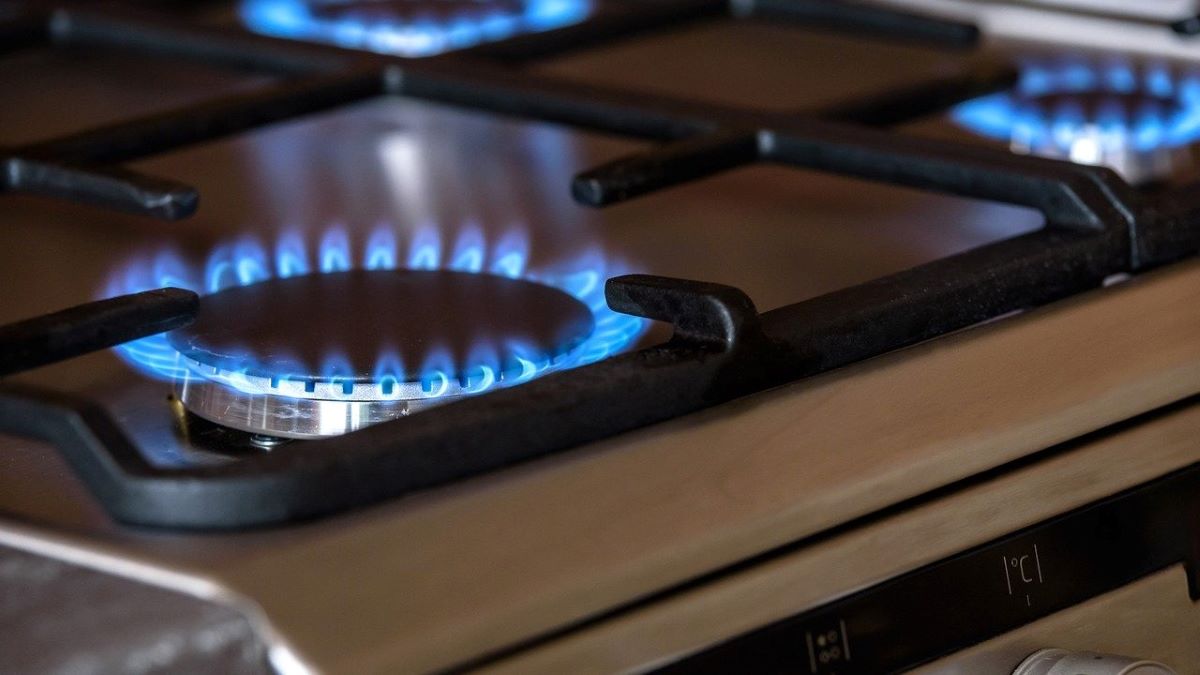
Ask Best Buy to help protect us from gas stove pollution.
With home heating prices rising this winter, MASSPIRG offers tips and resources for reducing your costs.
Updated
SIGN THE PETITION
Consumer tips and resources for reducing home heating costs
Heating costs expected to rise this winter, 2022-23
Prices for electric, gas and oil heat are all expected to jump to some of the highest levels in a decade. According to the Massachusetts Department of Energy Resources preliminary heating cost projections, the cost of heating for residential customers is expected to be 28.6% higher for homes heating with natural gas, 18.6% higher for heating oil, 3.0% for propane, and 54.6% for electric heating (which is driven primarily by resistance or baseboard heaters). National Grid recently announced new rates would go into effect on January 1, 2023, resulting in an estimated 64% increase in heating costs for electric customers.
According to the Department of Energy Resources heating costs analysis projecting 2022/23 heating costs in Massachusetts, heating oil remained the most expensive fuel to heat an average household this past winter, costing $2,237 through the winter. Propane was less expensive at $1,583 while natural gas heating totaled $840 in the 2021/22 heating season. Electric heating, primarily resistance heaters also known as electric baseboard heating, was cheapest at an estimated $816. However, according to Rewiring America, using electric heat pumps cost about half as much as electric resistance heaters, approximately $400.
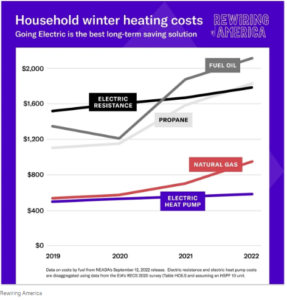
Photo by Rewiring America | Used by permission
The increase is being fueled in part by global demand, the war in Ukraine, constraints on domestic supply, extreme weather and other factors. The volatility is magnified in New England as we are overly dependent on natural gas, which accounts for about 38% of the country’s electricity, but here in New England, it’s 53%.
Transitioning from fossil fuels to renewable energy sources will make us less vulnerable to energy cost hikes of the global fossil fuel market. Additionally, the more renewable clean energy we use serves to reduce the impact of climate change.
In the meantime, Baystaters can reduce the energy they use, and their costs this winter, by taking steps to improve their homes’ energy efficiency and conservation.
Currently, slightly more than half the homes in Massachusetts are heated with gas, 25% with oil and 16% with electricity (includes resistance and heat pumps).
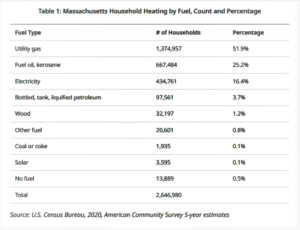
Photo by MA Dept of Energy | Public Domain
The cheapest energy is energy you do not use. Making your home more energy efficient will not only save you money it will also protect our environment.
Get a free Energy Assessment: MassSave, Massachusetts’s ratepayer-funded energy efficiency program is run by local gas and electric utilities and regulated by the state. An Energy Assessment can help you save on your monthly energy costs by making your 1-to-4 unit home more energy efficient.
An Energy Assessment typically takes two hours. The energy professional assesses your home’s current energy use and can install energy-saving products at no cost. They will look for your biggest opportunities to save energy and outline available rebates on insulation, qualified appliances, and more energy-saving measures available for gas, oil, propane, and electricity customers, regardless of household income.
MassSave.com, https://www.masssave.com/, 1-866-527-7283
Note: If you live in a municipal utility district, please call your electric utility directly for information on no-cost assessments, rebates, and programs in your area.
If you are a low-income fuel assistance recipient, contact your Community Action Agency (CAA) to schedule your assessment. Find your CAA at 1-800-632-8175 or here.
Get your furnace cleaned: Make sure your furnace is professionally cleaned and maintained.
Consider energy efficient water heaters and appliances: Rebates and incentives are available for some appliances and water heaters. Water heating is the third-largest energy user in the average home. Consider indirect water heaters, heat pumps, or hybrid water heaters. If you can not replace them now, you should consider updating to more efficient appliances when your current appliances or water heater needs replacing. Massachusetts Energy Rebates and Incentives.
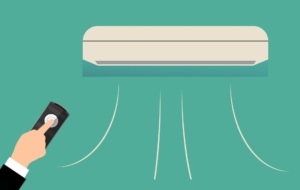
Photo by pixabay | Pixabay.com
Based on an analysis by Rewiring America, heating this winter with Energy Star rated heat pumps is far cheaper than oil, gas, propane and electric resistance heaters.
Resistance heaters — baseboard panels that are heated with coils, are quite inefficient at converting electricity to heat. Heat pumps, which compress condensing liquids to move temperatures from outdoors to indoors in the same way that air conditioners do, use less than half as much electricity as resistance heaters, according to the U.S. Department of Energy. The good news, in addition to energy savings, there are rebates available for the purchase and installation of heat pumps and other efficient appliances.
You can save 1-3% on your heating bill for each degree you turn down your thermostat in the winter. Consider these tools to help conserve energy.
Install programmable thermostats: Programmable thermostats make it
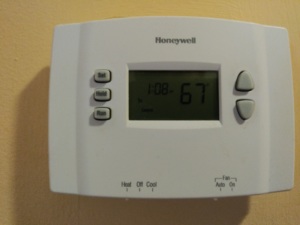
Photo by TPIN staff | TPIN
easy to set a schedule for heating and cooling your home most efficiently, using less energy when you’re in bed or when you’re away from the house. You can also program the thermostat to turn the heat on 30 minutes before you wake or get home from school or work.
Lower the temperature on your water heater: Set your hot water thermostat to 120 degrees. Take showers instead of baths, use low-flow shower heads and faucets, and wash clothes in cold water.
Windows: Remove AC units, close storm windows, lock all windows and if they can not be locked try using shims to to bring the upper and lower sashes together. Keep drapes, window blinds and shades open during daylight hours and closed at night.
Wear a sweater: Wearing a sweater will allow you to feel more comfortable when setting the thermostat lower.
You should regularly check with local utilities to compare prices and services. Some utilities will allow you to spread the cost of fuel over the year. Utilities typically offer several customer assistance programs, including flexible payment plans (regardless of income). You will be protected from shutoff if you make payments as scheduled under the plan.
Learn more about how to read and compare your utility bill here, from the Department of Energy Resources.
Largest gas and electric utilities in Massachusetts:
BERKSHIRE GAS (800) 292-5012
EVERSOURCE (866) 861-6225 (East) (877) 963-2632 (West) (800) 688-6160 (EGMA)
LIBERTY (800) 544-4944
NATIONAL GRID (800) 322-3223
UNITIL (888) 301-7700
Low income Fuel assistance: the Low Income Home Energy Assistance Program (LIHEAP) provides eligible households with help in paying a portion of winter heating bills. Homeowners and renters including households whose cost of heat is included in the rent can apply at the agency in their area. Eligibility is based on household size and the gross annual income of every household member, 18 years of age or older. Household income cannot exceed 60% of estimated state median income, which is currently $81,561 for a family of four and $42,411 for an individual. https://www.mass.gov/service-details/learn-about-home-energy-assistance-liheap
Utility shut off protections and resources: If you or someone you know is having issues with your energy or utility bills, see this site for help with paying bills, shut-off protections, consumer rights and more. See National Grid Discounted program here.
The Salvation Army offers emergency help for Massachusetts residents who, because of temporary financial difficulty, cannot meet a month’s energy expense and is not eligible for state or federal energy assistance.
Under certain conditions your utilities may not be shut off, even if you haven’t or can’t pay your bill.
WBUR has an easy to use map to see what programs are available in your area.
Complaints:
Department of Public Utilities: To file a complaint involving a gas, electric or water utility, call (617) 737-2836 or 1-877-886-5066 (toll-free), or file a complaint online.
Office of Attorney General: https://www.mass.gov/how-to/file-a-consumer-complaint, (617) 727-8400
Organizations/websites:
Green Energy Consumers Alliance, is a nonprofit energy company whose mission is to harness the power of energy consumers to speed the transition to a low-carbon future.
Rewiring America, national non profit organization focused on electrification.
MASS Save, offers Massachusetts residents free energy audits.
Massachusetts Energy Rebates & Incentives, a guide to energy rebates and incentives available in Massachusetts including: energy efficiency (home, appliances, business), renewables, clean heating and cooling, alternative transportation and more.
Understanding your electric bill, WBUR, Why electricity prices are rising unevenly across New England.
EnergySaver, US Department of Energy, resources and guides on energy efficiency.
Click here for downloadable consumer guide:
Deirdre runs MASSPIRG’s public health, consumer protection and tax and budget programs. Deirdre has led campaigns to improve public records law and require all state spending to be transparent and available on an easy-to-use website, close $400 million in corporate tax loopholes, protect the state’s retail sales laws to reduce overcharges and preserve price disclosures, reduce costs of health insurance and prescription drugs, and more. Deirdre also oversees a Consumer Action Center in Weymouth, Mass., which has mediated 17,000 complaints and returned $4 million to Massachusetts consumers since 1989. Deirdre currently resides in Maynard, Mass., with her family. Over the years she has visited all but one of the state's 351 towns — Gosnold.